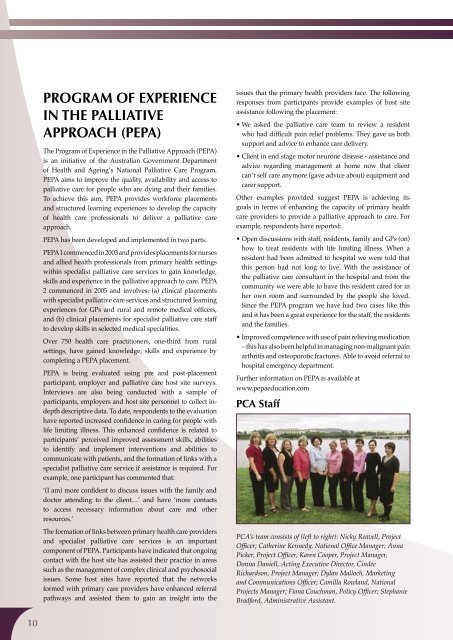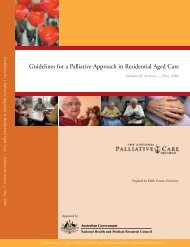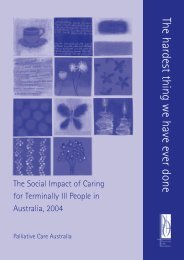Download - Palliative Care Australia
Download - Palliative Care Australia
Download - Palliative Care Australia
Create successful ePaper yourself
Turn your PDF publications into a flip-book with our unique Google optimized e-Paper software.
PROGRAM OF EXPERIENCE<br />
IN THE PALLIATIVE<br />
APPROACH (PEPA)<br />
The Program of Experience in the <strong>Palliative</strong> Approach (PEPA)<br />
is an initiative of the <strong>Australia</strong>n Government Department<br />
of Health and Ageing’s National <strong>Palliative</strong> <strong>Care</strong> Program.<br />
PEPA aims to improve the quality, availability and access to<br />
palliative care for people who are dying and their families.<br />
To achieve this aim, PEPA provides workforce placements<br />
and structured learning experiences to develop the capacity<br />
of health care professionals to deliver a palliative care<br />
approach.<br />
PEPA has been developed and implemented in two parts.<br />
PEPA 1 commenced in 2003 and provides placements for nurses<br />
and allied health professionals from primary health settings<br />
within specialist palliative care services to gain knowledge,<br />
skills and experience in the palliative approach to care. PEPA<br />
2 commenced in 2005 and involves: (a) clinical placements<br />
with specialist palliative care services and structured learning<br />
experiences for GPs and rural and remote medical officers,<br />
and (b) clinical placements for specialist palliative care staff<br />
to develop skills in selected medical specialities.<br />
Over 750 health care practitioners, one-third from rural<br />
settings, have gained knowledge, skills and experience by<br />
completing a PEPA placement.<br />
PEPA is being evaluated using pre and post-placement<br />
participant, employer and palliative care host site surveys.<br />
Interviews are also being conducted with a sample of<br />
participants, employers and host site personnel to collect indepth<br />
descriptive data. To date, respondents to the evaluation<br />
have reported increased confidence in caring for people with<br />
life limiting illness. This enhanced confidence is related to<br />
participants’ perceived improved assessment skills, abilities<br />
to identify and implement interventions and abilities to<br />
communicate with patients, and the formation of links with a<br />
specialist palliative care service if assistance is required. For<br />
example, one participant has commented that:<br />
‘(I am) more confident to discuss issues with the family and<br />
doctor attending to the client…’ and have ‘more contacts<br />
to access necessary information about care and other<br />
resources.’<br />
The formation of links between primary health care providers<br />
and specialist palliative care services is an important<br />
component of PEPA. Participants have indicated that ongoing<br />
contact with the host site has assisted their practice in areas<br />
such as the management of complex clinical and psychosocial<br />
issues. Some host sites have reported that the networks<br />
formed with primary care providers have enhanced referral<br />
pathways and assisted them to gain an insight into the<br />
issues that the primary health providers face. The following<br />
responses from participants provide examples of host site<br />
assistance following the placement:<br />
• We asked the palliative care team to review a resident<br />
who had difficult pain relief problems. They gave us both<br />
support and advice to enhance care delivery.<br />
• Client in end stage motor neurone disease - assistance and<br />
advice regarding management at home now that client<br />
can’t self care anymore (gave advice about) equipment and<br />
carer support.<br />
Other examples provided suggest PEPA is achieving its<br />
goals in terms of enhancing the capacity of primary health<br />
care providers to provide a palliative approach to care. For<br />
example, respondents have reported:<br />
• Open discussions with staff, residents, family and GPs (on)<br />
how to treat residents with life limiting illness. When a<br />
resident had been admitted to hospital we were told that<br />
this person had not long to live. With the assistance of<br />
the palliative care consultant in the hospital and from the<br />
community we were able to have this resident cared for in<br />
her own room and surrounded by the people she loved.<br />
Since the PEPA program we have had two cases like this<br />
and it has been a great experience for the staff, the residents<br />
and the families.<br />
• Improved competence with use of pain relieving medication<br />
– this has also been helpful in managing non-malignant pain<br />
arthritis and osteoporotic fractures. Able to avoid referral to<br />
hospital emergency department.<br />
Further information on PEPA is available at<br />
www.pepaeducation.com<br />
PCA Staff<br />
PCA’s team consists of (left to right): Nicky Reavell, Project<br />
Officer; Catherine Kennedy, National Office Manager; Anna<br />
Picker, Project Officer, Karen Cooper, Project Manager,<br />
Donna Daniell, Acting Executive Director, Cindee<br />
Richardson, Project Manager; Dylan Malloch, Marketing<br />
and Communications Officer; Camilla Rowland, National<br />
Projects Manager; Fiona Couchman, Policy Officer; Stephanie<br />
Bradford, Administrative Assistant.<br />
10

















